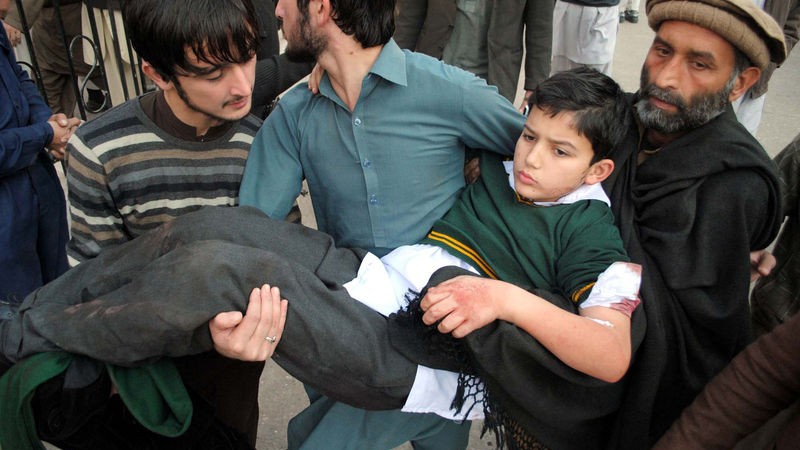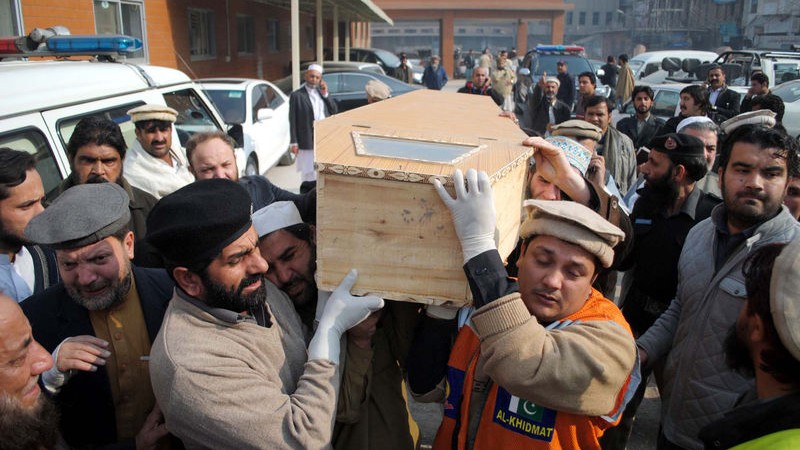 |
| Victims of militants, who attacked an army public school situated on Warsak Road, are moved for treatment at a local hospital in Peshawar. Image by ppiimages. Copyright Demotix (16/12/2014) |
But one particular hashtag is worth noting -- Indians are putting aside their ardent rivalry with Pakistan and expressing solidarity with their neighbors at this difficult time under #IndiawithPakistan on Twitter.
Yes, I am Indian. So what? The pain of losing a child is universal. #IndiawithPakistan
— Dipankar #LDL (@deep_anchor) December 16, 2014
At around 11 a.m. Pakistan time on December 16, six Taliban militants entered the Army-run school in the capital of Khyber Pakhtunkhwa and took around 500 students and teachers hostage. The attackers were dressed as soldiers and opened fire at random, also detonating an unknown number of suicide bombs. A teacher was reportedly burned alive in front of pupils and children were shot in the head. One hundred and forty-one people were killed, most of whom were children, and hundreds injured in the siege. According to police, all the militants were killed.The Taliban, in a statement to Reuters, said that they targeted the school because the army targets their families in an ongoing military offensive against Taliban strongholds near Peshawar. “We want them to feel our pain,” the statement said.
Dr. Asif Sohrab described on Facebook the horror in Peshawar:
2,3 funerals in every Street of Peshawar. In my street there are 3! Peshawar bleeds, Pakistan cries.On such a sad day, #IndiawithPakistan generated a lot of good vibes:
No Indian I know is indifferent to the horror in Peshawar. Nothing can be worse than sending your children2school ¬ having them come back
— Shashi Tharoor (@ShashiTharoor) December 16, 2014
Children are the first casualty of violence and war. It is time we all came together and #PutAStop to this violence. #PeshawarAttack
— Kailash Satyarthi (@k_satyarthi) December 16, 2014
These are the school children who were attacked in #PeshawarAttack today. Hold your heart people. #IndiawithPakistan pic.twitter.com/m5xWpJQ6hh"
— Muhammad Safeen (@SafeensS) December 16, 2014
Because bigots, radicals and murderers on either side of the border need to be wiped off from the face of humanity #IndiawithPakistan
— Rana Ayyub (@RanaAyyub) December 16, 2014
We want to live by each other's happiness, not each other's misery. #IndiaWithPakistan #PeshawarAttack pic.twitter.com/RPTYuboDz5
— India Loves Pakistan (@IndLovesPak) December 16, 2014
Share the pain of our Pakistani brothers & sisters grieving for children slaughtered by Taliban.Strength,solidarity,hope #IndiawithPakistan
— Sagarika Ghose (@sagarikaghose) December 16, 2014
In response to the attack, Pakistani Prime Minister Nawaz Sharif announced three days of mourning and has called an all party parliamentary meeting at the Governor House in Peshawar on Wednesday. |
| Men carry the casket of a victim of the Taliban shoot-out in a military-run school in Peshawar, Pakistan. Image by ppiimages. Copyright Demotix (16/12/2014) |
This is not my religion, not my politics. I would rather have no god than a god that justifies the mass murder of children. #PeshawarAttack
— Ali Dayan Hasan (@AliDayan) December 16, 2014
Which God, which religion allows u to kill 100 innocent children. Shame on Taliban! Shame, Shame, Shame. Taliban u r real enemy of God.
— Qamar Waheed Naqvi (@qwnaqvi) December 16, 2014
Don't call it resilience. Its our criminal silence in the face of violence that let terrorists play havoc.We mourn everyday w/out learning.
— Umar Cheema (@UmarCheema1) December 16, 2014
Mehr Tarar, a former op-ed editor for Pakistan's Daily Times, captured the heartbreak of many Pakistanis in a column for Indian news portal NDTV:Today, I feel as if I have been punched in my stomach. In my heart. And in my soul. With an iron rod. As I hear of children who were killed in an Army school in Peshawar, I feel my heart stopping.Writing in independent Canadian news website Ricochet, journalist Jahanjeb Hussain offered his view on what good, if any, could come of the attack:
Children were shot in the face. Children were shot in the head. Children were dragged out from under the chairs, under the tables, and shot. At point blank. Methodically. Coldly. Clinically. They - who go by the name of the Tehreek-e-Taliban Pakistan - say it is to avenge the Army operation against them in the FATA. To avenge the deaths of militants who were wreaking havoc on innocent Pakistanis in myriad acts of terror. It's retribution, they say.
I have nothing to say here. You call yourself a Muslim, you call your fight a jihad, you call your way that of Allah. And yet you do what Allah forbids you to do: to perpetrate a war in His name where you kill children. Where you kill people who have never harmed you. You are not just Pakistan's enemy but you are also your own worst enemy.
The best hope is that this attack would finally convince the country’s leadership that meaningful, concentrated, and long-term action needs to be taken across the board.
Anushe Noor Faheem contributed to this post.
The post was also published in Global Voices Online.
























0 comments:
Post a Comment